Q&A: JANE McGONIGAL, REALITY IS BROKEN – How Games Make Us Better and How They Can Change the World
Written on January 24th, 2012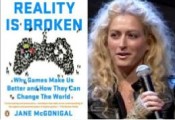 |
Aired 01/20/12
There are 183 million active video gamers in the US, and the average young person will spend 10,000 hours gaming by the age of 21. There are now more than five million “extreme” gamers” in the US who play an average of 45 hours a week.
According to game designer JANE McGONIGAL, this is because videogames are increasingly fulfilling genuine human needs. But she goes way beyond that, in her first book, REALITY IS BROKEN — just out in paperback – she suggests we can use the lessons of game design to fix what is wrong with the real world.
Drawing on positive psychology, cognitive science, and sociology, she shows how game designers have hit on core truths about what makes us happy so that videogames consistently provide the exhilarating rewards, stimulating challenges, and epic victories that are so often lacking in the real world.
I recommend Reality Is Broken to people who have no interest in games. Separate from what it says about the current reality and possible future of games, the book is an excellent primer on what we have learned – and most people don’t know – about happiness, learning, productivity and growth.
Q&A: LESTER BROWN, Worldwatch Institute
Written on April 14th, 2011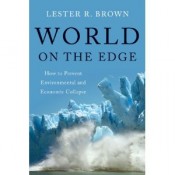 |
Aired 04/10/11
LESTER BROWN has been described by the Washington Post as "one of the world's most influential thinkers." After working with the Department of Agriculture in international agricultural development, Brown helped establish the Overseas Development Council, then founded the Worldwatch Institute, which plays an important role in the public's understanding of trends in our global environment with its annual State of the World report and Vital Signs. In 2001, he left Worldwatch, founded Earth Policy Institute, and continues his vital work. During a career that began with tomato farming, Brown has been honored with numerous prizes, including the MacArthur "Genius" Fellowship, the United Nations Environment Prize, and Japan's Blue Planet Prize, along with some 20 honorary degrees.
In his new book, WORLD ON THE EDGE: HOW TO PREVENT ENVIRONMENTAL AND ECONOMIC COLLAPSE, BROWN lays out the symptoms, the diagnosis, and the cure, what he calls "Plan B". He estimates that we could solve all the world's greatest problems for $200B a year - less than a third the US defense budget - but it will take an all-out response at wartime speed proportionate to the magnitude of the threats facing civilization.
Q&A: SHARON SALZBERG, Author/co-founder of the Insight Meditation
Written on February 18th, 2011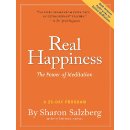 |
Aired 02/06/11
SHARON SALZBERG has been a student of meditation since 1971, and leading meditation retreats worldwide since 1974. A co-founder of the Insight Meditation Society in Barre, Massachusetts, Sharon is the author of Loving Kindness: The Revolutionary Art Of Happiness; A Heart As Wide As The World; Faith: Trusting Your Own Deepest Experience; co-author with Joseph Goldstein of Insight Meditation: A Step-By-Step Course On How To Meditate. Her newest book is REAL HAPPINESS: THE POWER OF MEDITATION.
Q&A: PARAG KHANNA, Author
Written on January 17th, 2011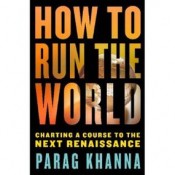 |
Aired 01/16/11
PARAG KHANNA is a Senior Research Fellow in the American Strategy Program at the New America Foundation. In 2008, he was named one of Esquire's "75 Most Influential People of the 21st Century," a Young Global Leader of the World Economic Forum, and one of fifteen people on WIRED magazine's "Smart List." Khanna holds a PhD from the London School of Economics, and Bachelors and Masters degrees from the School of Foreign Service at Georgetown University. He is author of the international best-seller The Second World: Empires and Influence in the New Global Order and his newest, How to Run the World: Charting a Course to the Next Renaissance.
Q&A: STEVEN HILL, Author – Europe’s Promise
Written on June 2nd, 2010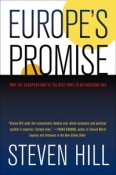 |
Aired 05/30/10
We're hearing a lot about the trouble Europe is in. The debt crisis in Greece, and perhaps Spain, Portugal, and Italy, is threatening the Euro and the European Union. What's really going on? How did it happen? How bad is it? How will they deal with it? And what does it mean for the rest of the world and for the US in particular?
We'll deal with those issues this Sunday, but that's not all. While the bad news of this Euro crisis makes headlines in the US, a quiet and successful revolution taking place in Europe does not. Europe seems to be finding a way to make capitalism and democracy work for people, not just for corporations. I think this is a critical unreported story in terms of its potential impact. Here's just a few things you may not have heard about.
The European Union, 27 member nations with a half billion people, has become the largest, wealthiest trading bloc in the world, producing nearly a third of the world's economy - nearly as large as the U.S. and China combined. Europe has more Fortune 500 companies than either the US, China or Japan.
European nations are rated by the World Health Organization as having the best health care systems in the world. Yet they spend far less than the United States for universal coverage, even as U.S. health care is ranked 37th.
Europe leads in confronting global climate change with renewable energy technologies like solar and wind power, conservation and "green design," creating hundreds of thousands of new jobs in the process. Consequently, Europe's ecological "footprint" (the amount of the earth's capacity that a population consumes) is about half that of the United States for the same standard of living.
